|
|
|
Sort Order |
|
|
|
Items / Page
|
|
|
|
|
|
|
| Srl | Item |
| 1 |
ID:
156211
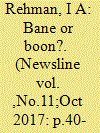

|
|
|
| 2 |
ID:
097799
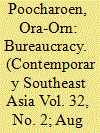

|
|
|
| 3 |
ID:
108968
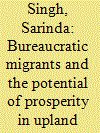

|
|
|
|
|
| Publication |
2011.
|
| Summary/Abstract |
This paper argues that Lao bureaucrats who migrate to the uplands offer possibilities for re-thinking the immutability of upland-lowland distinctions and the power of the modern state. The specific focus is on low-ranking government officials on the Nakai Plateau in central Laos who are positioned at the nexus of state authority, development schemes and the rural poor. Nakai is a site of nationally significant resource utilisation and practices that has provided a model for development across the country. Officials' experiences in Nakai suggest that the upland-lowland contrast can provide valuable understandings of power when combined with an awareness of social processes that reproduce and shift the meanings ascribed to these nominally distinct domains. Significantly, the experiences of mobile marginal officials highlight an idea of state power as the potential to grant prosperity.
|
|
|
|
|
|
|
|
|
|
|
|
|
|
|
|
| 4 |
ID:
191964
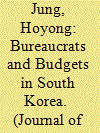

|
|
|
|
|
| Summary/Abstract |
This article presents evidence that high-ranking public officials in the Ministry of Strategy and Finance in South Korea affect local budget allocation. Applying a regression model on a uniquely constructed panel dataset, I found that the growth rate of the per-capita National Subsidy, which is a subcomponent of the national budget susceptible to discretionary behaviors, increases approximately 7 percent in the hometowns of high-ranking bureaucrats. To validate these findings and address causality, I conducted a battery of auxiliary robustness checks, which yielded confirmatory results. This study also found that enhancing transparency in the budget allocation system can alleviate concerns about bureaucratic hometown favoritism, providing suggestive evidence of bureaucrats’ rent-seeking behaviors without government transparency.
|
|
|
|
|
|
|
|
|
|
|
|
|
|
|
|
| 5 |
ID:
172579
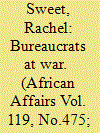

|
|
|
|
|
| Summary/Abstract |
Rebels often portray themselves as state-like to legitimize their rule, yet little is known about their on-the-ground relations with the administrators of state power—official bureaucrats. Drawing on internal armed group records from the Democratic Republic of Congo, this article argues that rebels’ state-like image is more than a simple veneer: Bureaucrats actively sustain state institutions and recruit rebel support during war. It develops a theory of the sources of leverage that bureaucrats use to negotiate with rebels. These interactions entail dual struggles to sustain the structures and symbols of state power and to shape the distribution of control over these institutions during war. On first front, bureaucrats can use their official status to market the symbols of state legitimacy—official certificates, codes, and paperwork—to rebels. On a second, to recruit protection for administrative posts. Pre-existing routines of noncompliance, like parallel taxes and sabotaged information, can use bureaucratic discretion and opacity to limit rebels’ takeover of state structures. This view from the ground demonstrates the real-time continuity of bureaucratic practice through daily paperwork and exchange during war. It contributes to research on rebel governance by illustrating new competitions for wartime statehood and illustrates the empirical practices of states seen as ‘juridical’ or weak.
|
|
|
|
|
|
|
|
|
|
|
|
|
|
|
|
| 6 |
ID:
143513
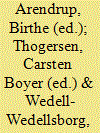

|
|
|
|
|
| Publication |
London, Curzon Press Ltd., 1986.
|
| Description |
vii, 175p.pbk
|
| Series |
Studies on Asian topics; no, 9
|
| Standard Number |
0700701745
|
|
|
|
|
|
|
|
|
|
|
|
Copies: C:1/I:0,R:0,Q:0
Circulation
| Accession# | Call# | Current Location | Status | Policy | Location |
| 027534 | 951.058/ARE 027534 | Main | On Shelf | General | |
|
|
|
|
| 7 |
ID:
170930
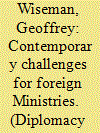

|
|
|
|
|
| Summary/Abstract |
Whilst the diplomatic studies field has grown impressively in the past decade, paradoxically there is much still to be learnt about ‘state foreign services’, a term covering the two sides of the diplomacy coin: diplomats serving at home – in the Foreign Ministry – and abroad – at embassies and consulates. Diplomats have a Janus-faced view of their profession: as envoys abroad and bureaucrats at home. This analysis first assesses the American approach to diplomacy’s two sides, focusing on the impact of the Donald Trump presidency as a benchmark. Flowing from this are several key challenges that bedevil virtually all democratic foreign ministries: How to frame the ‘national interest’? How to represent blemished or populist leaders? How to deal with dissent? How to balance the field-headquarters nexus? And how to manage relations with non-state actors. So long as the Westphalian state system survives, so, too, will the two-sided foreign-service model. Only when moving away from diplomacy as ‘state practice’ to diplomacy as ‘social practice’ can the foreign-service model recede, with diplomacy becoming disintermediated, omnilateral, and post-Westphalian, potentially manifesting radically different practices.
|
|
|
|
|
|
|
|
|
|
|
|
|
|
|
|
| 8 |
ID:
084545
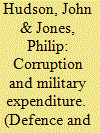

|
|
|
|
|
| Publication |
2008.
|
| Summary/Abstract |
We analyse the determinants of the number of military personnel, military expenditure and arms imports using a panel data of all available countries with data from 1984-2006. The number of military personnel increases with the extent of external threat and with conscription. There is evidence for both economies of scale and the existence of 'ghost soldiers'. Expenditure, given the number of military personnel, increases with the extent of internal threat and the area of the country. Arms imports increase with the extent of external threat, GDP per capita and corruption. Finally, both arms imports and military expenditure impact upon corruption.
|
|
|
|
|
|
|
|
|
|
|
|
|
|
|
|
| 9 |
ID:
171203


|
|
|
|
|
| Summary/Abstract |
What explains the passage of Thailand's landmark universal healthcare (UHC) policy? In separate contributions, Selway and Harris emphasized the role of electoral rules and political parties, on one hand, and “professional movements” of developmentally minded state bureaucrats on the other. Which is correct? In this article, Selway and Harris respond to each other's work. While Selway agrees that the actions of the professional movement constitute an underappreciated necessary condition for universal healthcare in Thailand, he argues that Harris overstates the role of the movement in implementation. Harris defends his position and maintains that an institution-focused account is insufficient, arguing that the actions of Thailand's Rural Doctors’ Movement not only explain universal healthcare but also gave rise to the very electoral rule changes that Selway argues were so critical to facilitating universal coverage. Selway responds to these criticisms, and the two researchers jointly consider implications for causation, qualitative research, and policymaking theory.
|
|
|
|
|
|
|
|
|
|
|
|
|
|
|
|
| 10 |
ID:
140202
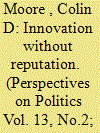

|
|
|
|
|
| Summary/Abstract |
The Veterans Health Administration (VA) is among the most unusual and misunderstood institutions in the American welfare state. Unlike most American social services, veterans’ medical care continues to be administered directly by the state, contrary to the “antibureaucratic strategy” of “hidden” or “submerged” state-building that has dominated US social policy for decades. Drawing on extensive archival research, I attempt to make sense of the VA’s unique policy trajectory by exploring two puzzling episodes of institutional change in the delivery of veterans’ health care. Although many bureaucratic models predict large new undertakings initiated by agencies only when they benefit from the advantages of being well-regarded and relatively autonomous, both instances of institutional change occurred at the nadir of the VA’s reputation as a competent, innovative, and politically-powerful agency. To explain these unexpected transformations, I investigate the role of bureaucrats in shaping the development of the American welfare state and develop the concept of collaborative state-building to demonstrate how public-private partnerships may contribute to the expansion of social welfare programs in liberal states. Although public-private partnerships are usually seen as an erosion of state power or a way to hide the state’s role in the provision of social services, the case of the VA suggests that such partnerships may be used to support and expand such programs. I also focus on the VA’s many scandals and show how agency officials used these policy failures to expand the VA.
|
|
|
|
|
|
|
|
|
|
|
|
|
|
|
|
| 11 |
ID:
113585
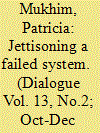

|
|
|
| 12 |
ID:
087532
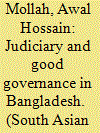

|
|
|
|
|
| Publication |
2008.
|
| Summary/Abstract |
The terms 'governance' and 'good governance' are increasingly being used in development literature. Intellectuals, bureaucrats and civil society members alike are accepting the spirit of the concept and are conceiving it in the context of their own experience and environment. The Bangladeshi government has recently been under constant pressure from various donor agencies for ensuring good governance. The implementation and achievement of good governance depends upon the transparency, honesty and efficiency of the legislature, executive and judiciary, along with the cooperation of civil society and the private sector. The main concern of this article is to analyse the role of the judiciary in the pursuit of good governance in Bangladesh. The study will focus on the Bangladesh Supreme Court in order to evaluate its role in ensuring good governance.
|
|
|
|
|
|
|
|
|
|
|
|
|
|
|
|
| 13 |
ID:
078971
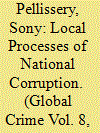

|
|
|
|
|
| Publication |
2007.
|
| Summary/Abstract |
This paper provides a bottom-up view of national corruption in India and presents a framework of corruption involving three actors: bureaucrat, politician and legitimate claimant. The paper then focuses on the public service provision of social security in an Indian village and the role of elites in perpetuating the corrupt practices to access this public provision. This study is based on an extensive fieldwork and uses network data. First, I show that the political elite bridges the 'structural hole' between the institutions of state and society, have the advantage of information, referrals and are the main beneficiary of local corrupt practices. Second, factional politics is carried out through the use of corruption and it results in exclusion of the poor persons from the welfare rights to which they are entitled. The paper also explores how the local processes of corruption interact with state-level processes and shows how protest against corruption is silenced.
|
|
|
|
|
|
|
|
|
|
|
|
|
|
|
|
| 14 |
ID:
090263
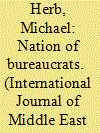

|
|
|
|
|
| Publication |
2009.
|
| Summary/Abstract |
Not long ago, two safe generalizations could be made about the Gulf monarchies: ruling families dominated their politics, and oil dominated their economies. In recent years that has begun to change. In Kuwait the parliament challenges the political predominance of the ruling family. Meanwhile, Dubai and, increasingly, the other emirates of the United Arab Emirates (UAE) have made real progress in diversifying their economies away from oil-at least until the recent economic crisis. Yet political liberalization and economic diversification have not gone hand in hand: Kuwait's economy remains dependent on oil, and the United Arab Emirates remains resolutely authoritarian. This is no accident. Kuwait's high level of political participation encourages its dependence on oil while the UAE's economic diversification requires a lack of political participation by citizens. The reasons for this are specific to the peculiar political economy of these labor markets: in these richest of rentier-states, there is little need for the class compromise between capitalists and workers on which capitalist democracy usually rests.
|
|
|
|
|
|
|
|
|
|
|
|
|
|
|
|
| 15 |
ID:
153773
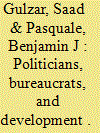

|
|
|
|
|
| Summary/Abstract |
When do politicians prompt bureaucrats to provide effective services? Leveraging the uneven overlap of jurisdictions in India, we compare bureaucrats supervised by a single political principal with those supervised by multiple politicians. With an original dataset of nearly half a million villages, we find that implementation of India’s National Rural Employment Guarantee Scheme, the largest employment program in the world, is substantially better where bureaucrats answer to a single politician. Regression discontinuity estimates help increase confidence that this result is causal. Our findings suggest that politicians face strong incentives to motivate bureaucrats as long as they internalize the benefits from doing so. In contrast to a large literature on the deleterious effects of political interventions, our results show that political influence may be more favorable to development than is commonly assumed.
|
|
|
|
|
|
|
|
|
|
|
|
|
|
|
|
| 16 |
ID:
163830
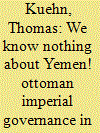

|
|
|
|
|
| Summary/Abstract |
This article analyzes changing concepts and practices of knowledge production and governance in the Ottoman Province of Yemen from the re-conquest of the Yemeni highlands in 1871–3 to the beginning of the First World War. It argues that, while Ottoman bureaucrats embraced modern governmentality by emphasizing the connection between local knowledge and effective governmental control, the production of knowledge about the political, social, cultural, and economic realities of southwest Arabia during this period cannot be reduced to acts of writing and the creation of government archives. While historians of the late Ottoman Empire have often suggested that knowledge production –– like other elements of imperial governance during the period under study –– became increasingly systematic and informed by bureaucratic rationality, I argue that in fact personal relations and oral communications remained the hallmarks of Ottoman knowledge production in Yemen until the early twentieth century. This began to change when the near collapse of Ottoman rule in Yemen in 1905, the end of the Hamidian regime in 1908–09, and new notions of professionalism prompted officials to view existing practices of knowledge production and transmission as partly responsible for the government’s failure to control this province. Now, they increasingly associated authoritative knowledge with published, scholarly accounts, while considering unrecorded knowledge unreliable.
|
|
|
|
|
|
|
|
|
|
|
|
|
|
|
|
| 17 |
ID:
084221
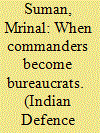

|
|
|
|
|
|
|
|